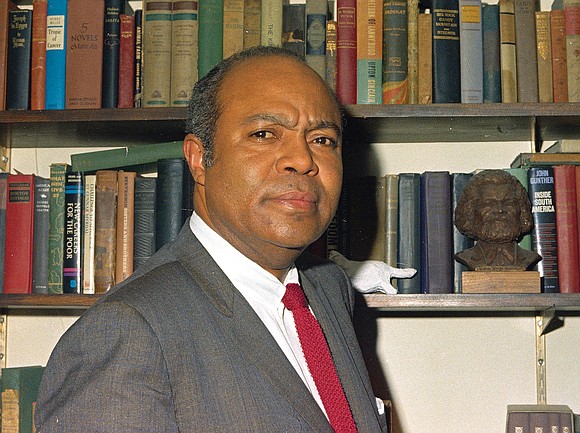Fredericksburg man carries on legacy of James Farmer
Free Press wire reports | 1/28/2021, 6 p.m.

FREDERICKSBURG - Christopher Williams works daily to carry on the legacy of the late civil rights leader James Farmer.
The legacy is in his job description—assistant director of the University of Mary Washington’s James Farmer Multicultural Center. It informs the work he does at the center along with its director, Dr. Marion Sanford—coordinating social justice teach- ins, creating a social justice fall break trip, curating a human rights film series and talking daily with students and community members about Black history and anti-racism.
The legacy of James Farmer—who founded the Congress of Racial Equality, led the first Freedom Rides and taught at UMW from 1984 to 1998 — is also personal for Mr. Williams. He is a product of the James L. Farmer Jr. — Scholars Program, which was created in 1987 to assist selected public school students in Fredericksburg, Spotsylvania, Caroline and Westmoreland counties with preparing for and enrolling in higher education.
“The scholars carry on (Mr. Farmer’s) legacy,” said Mr. Williams, who grew up five minutes from Mr. Farmer in Spotsylvania and knew him personally. “That was the whole vision for the scholars program — to create leaders for tomorrow. I am part of his legacy.”
Mr. Williams will tell his story of carrying on the Farmer legacy on the new PBS series “American Portrait,” which blends first-person stories about everyday people into a docu- mentary about what it means to be an American today.
Mr. Williams draws constant inspiration for his work from the fact that he feels Mr. Farmer has never received the widespread recognition he deserves.
In the 1960s, Mr. Farmer was known as one of the major leaders of the Civil Rights Movement, along with Dr. Martin Luther King Jr.; Congressman John Lewis; Roy Wilkins, director of the NAACP; Whitney Young, executive director of the National Urban League; and Dorothy Height, president of the National Council of Negro Women.
Yet today, many are not familiar with Mr. Farmer or many of the other leaders, with the exception of Dr. King, Mr. Williams said.
“I think the reason he hasn’t received the recognition and credit he deserved is because of the way we teach the history of the Civil Rights Movement in this country,” he said. “We focus on Dr. King — and rightfully so — but we just talk about Rosa Parks, Malcolm X and the ‘I Have a Dream’ speech, and that was the Civil Rights Movement for a lot of people.”
Mr. Farmer died July 9, 1999, in Fredericksburg at age 79.
Mr. Williams said many UMW students have never heard of James Farmer until they arrive on campus, where there is a bust of him in front of a building that was just renamed in his honor last year.
“Our job here is to continue the legacy of Mr. Farmer’s work but also to teach incoming students and colleagues about who this great man was and what he sacrificed and what he contributed to the betterment of American society,” Mr. Williams said.
Mr. Williams also draws from Mr. Farmer’s legacy to help him navigate through the current political climate, in which issues of social justice and systemic racism have again risen to the surface. He said he recently came upon a video of Mr. Farmer speaking in New York City following the killing of a young Black man by the police in 1964.
Mr. Farmer “was speaking about justice for the young man and how much we need to still be on the forefront of getting justice for everyone, but more so that young man,” Mr. Williams said. “And he would be saying those same things today. As sad as it sounds, it speaks to the regression that we’ve had, and how we need to continue to move forward and honestly tell the truth about the history of the country.”
Mr. Williams said Mr. Farmer always challenged people by speaking the truth.
“It’s uncomfortable, but that’s how you have to deal with the truth,” he said. “That’s the only way we heal these wounds that we carry. We have to deal with truth of what caused the wound in the first place. If you don’t address the wound and the harm that it has caused, there’s always going to be a wound. Until you treat it properly, it’s always a festering issue.”






